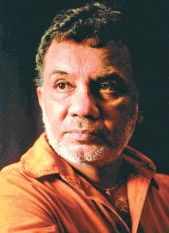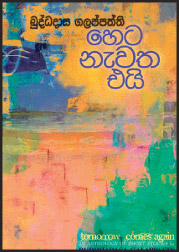Harnessing aesthetic senses
Amalshan GUNERATHNE
Galappatty’s literary works
Dolos Mahey Pahana (Poetry) – 1971
Katapath Pavura (Poetry) – 1972
Paara Vasa Atha (Poetry) – 1974
Piyasena Saha Kumarikava (Short Story Collection) – 1975
Rajinak Handuvaaya (Poetry) – 1976
Dedenama Diyaniyo (Poetry) – 1983
Nischalai Rathriya (poetry) – 1992
Reya Pahanak Vei (Short Story Collection) – 1994
Thuruliya Akuru Viya (Poetry) – 1998
Katuva Ennemi (Short Stories) – 2002
Davasa Hetai (Poetry) – 2003
Nim Him Nathi Thunyama (Poetry) – 2007
The Valley Below (Poetry – translated in to English by Malinee Govinnage)
Sarana Kala Mey Anduru Vanapetha (Novel) – 2009
The new short story collection will be launched
at Mihilaka Hall, BMICH, on Sepetember 2.
His delicately composed creative lines are a treat to the wearied
soul. Whether it is heart-rending poetic verses or analytical prose, his
creative compositions have the power to capture your senses and arouse
your mind’s eye to the bitter realities of our days.
|

Buddhadasa Galappatty |
A poet with a sensitive soul, he even went on to win the Best poet
award of the year award in 1999 at the State Literary Festival for his
collection of poetry Thuruliya Akuru Viya. Starting his creative
adventures as way back as early seventies, Buddhadasa Galappatty has
composed many timeless literary compositions that can touch your
aesthetic senses to the hilt.
 Buddhi will add yet another gem to his critically acclaimed literary
collection with the launch of his latest book, Heta Navatha Ei (Tomorrow
Comes Again). At a time where people’s aesthetic senses have turned
blunt, the work of an artiste such as Buddhasa Galappatty will do great
good to enhance the richness of Sri Lankan literature. The new short
story collection will be launched at Mihilaka Hall, BMICH, on Sepetember
2. Buddhi will add yet another gem to his critically acclaimed literary
collection with the launch of his latest book, Heta Navatha Ei (Tomorrow
Comes Again). At a time where people’s aesthetic senses have turned
blunt, the work of an artiste such as Buddhasa Galappatty will do great
good to enhance the richness of Sri Lankan literature. The new short
story collection will be launched at Mihilaka Hall, BMICH, on Sepetember
2.
“It was way back in 2002 I launched my last short story collection.
So it is after a nine years’ lapse that I am launching a new short story
collection. I don’t want to increase the number of books I write. But I
always want to come up with a work of art which has good artistic
value.”
The initial foundation for Buddhi’s creative adventures was laid
during his school times. Major part of his school life was spent at St
Servatius College Matara. Then he followed his higher studies in
Vidyodaya University Sri Lanka. Going back in the memory lane Buddhi
recalled:
“From my school days, I used to read a lot. I had an inspiring
Sinhala teacher. He started a class library in our school. He brought
books from Colombo to Matara and I used to read those books.
Those days I used to get good marks for the essays that I wrote in
the class. Then I sent my class essays to Silumina where they published
them in the children’s column. It was a wonderful feeling to see my
articles published in a national newspaper. As a small fellow it was a
great thing to see my name appear in a small column.”
His first poetry collection Dolos Mahey Pahana was published in 1971.
 After recognising his writing talents, Sunil Ariyarathne and Jayalath
Manorathne also contributed to his initial creative venture. Since then
Buddhasa has published eight poetry collections, three short story
collections and a novel. After recognising his writing talents, Sunil Ariyarathne and Jayalath
Manorathne also contributed to his initial creative venture. Since then
Buddhasa has published eight poetry collections, three short story
collections and a novel.
Forty years have been elapsed since Buddhi published his first
literary work. People’s attitude towards literature and art has changed
since then. The competitive nature of modern life is such that people no
longer pay interest towards cherishing their leisure time by reading a
work of art. The poetry anthologies, drama scripts have become mere
study material for school students. Speaking his thoughts on the
dilemma, Buddhasa explained:
“If students are reading a work of art for the sake of getting
through an exam, it does not serve any purpose. For instance, one of my
poems is selected to the new poetry syllabus, but if the student reads
that poem alone without knowing the writer’s background, he will not
gain anything out of it.”
Adding to his statement, he further noted: “From seventies lots of
things have changed, I can clearly see the difference. People’s life
style has changed. They no longer have the leisure time to engage
themselves in a work of art. It is like a rat race. Even if they do find
free time, they spend it on watching rubbish in television screen.”
He believes that the change has to come from the education system
itself. He believes that to harness talent, young people should be
encouraged to read and engage themselves in creative works from the
schooldays.
“You have to start from school. The school is the best place to groom
young people in to creative writing and reading,” he noted.
Buddhi has also been involved with theatre as a make-up artist. He
has won the Best Make-up Artist award five times at the State Drama
Festival. When queried as to whether he has any thoughts of writing
drama script, he humbly said, “I don’t think that will happen. I know my
limits.” However his attitude towards contemporary theatre is a positive
one. “I think Sinhala drama is just picking up and it is a good sign. We
did have a very lull period few years back, but now things are changing
for the better. People are fed up of monotonous teledramas and more
people are coming to watch dramas these days.” |



